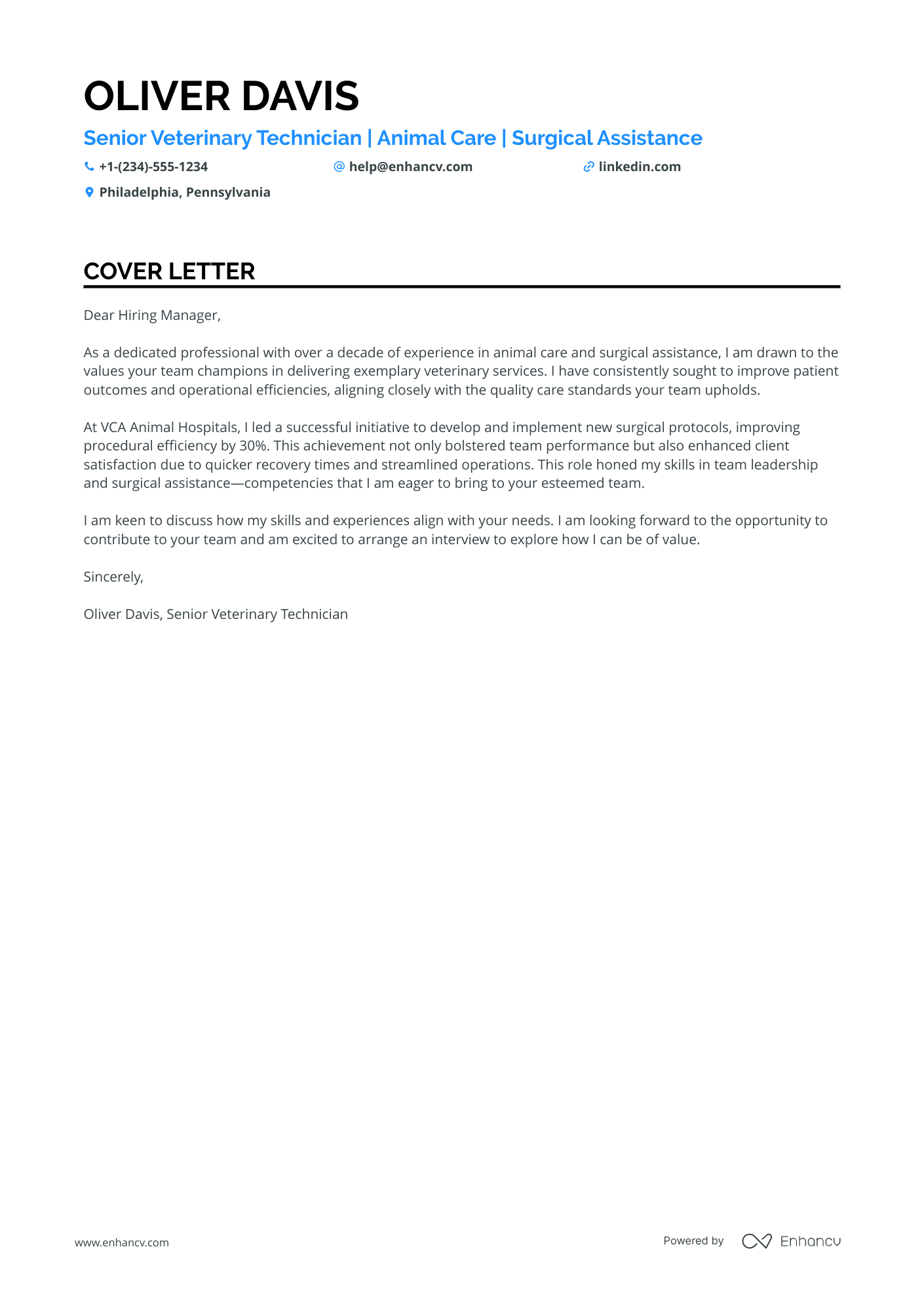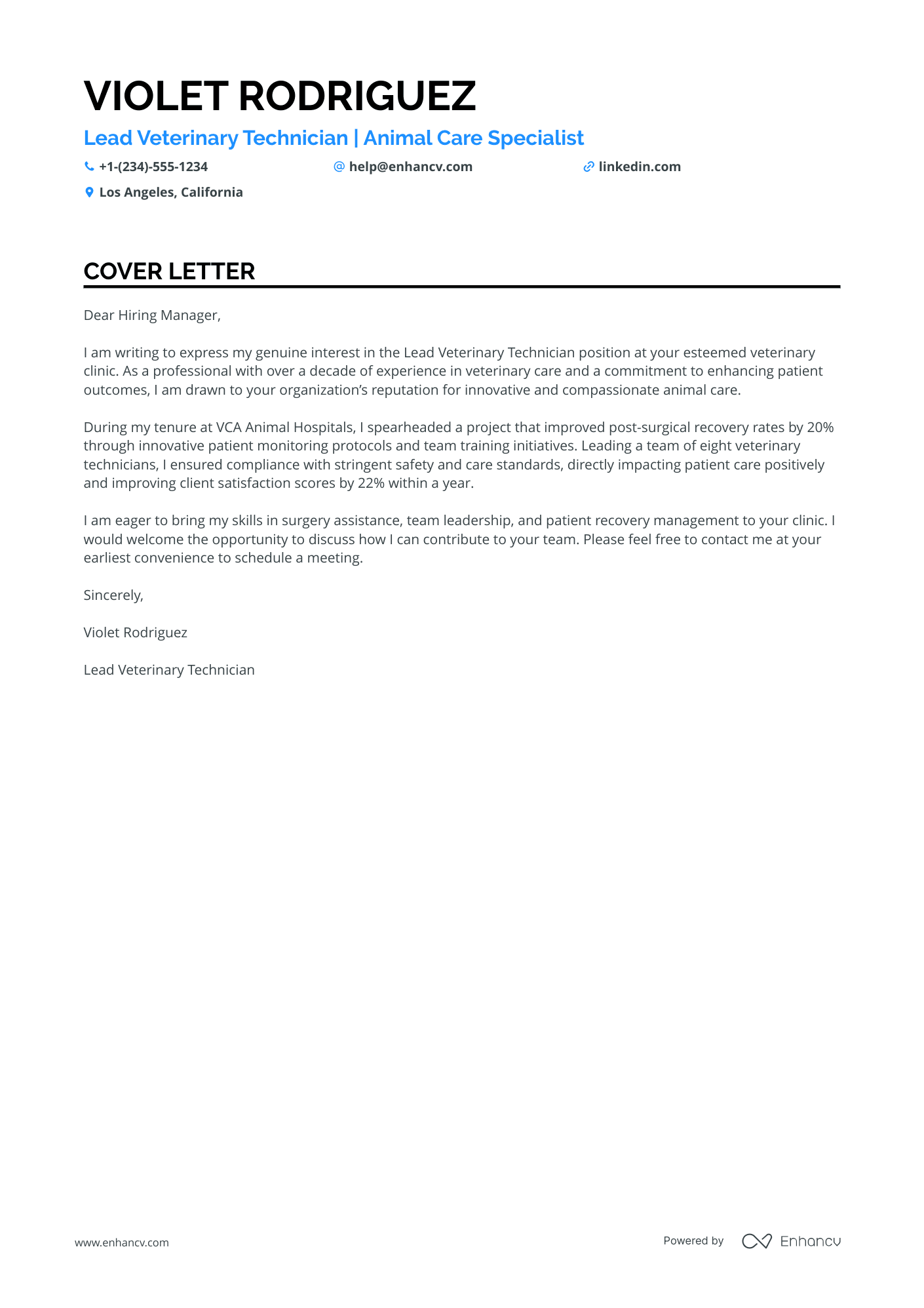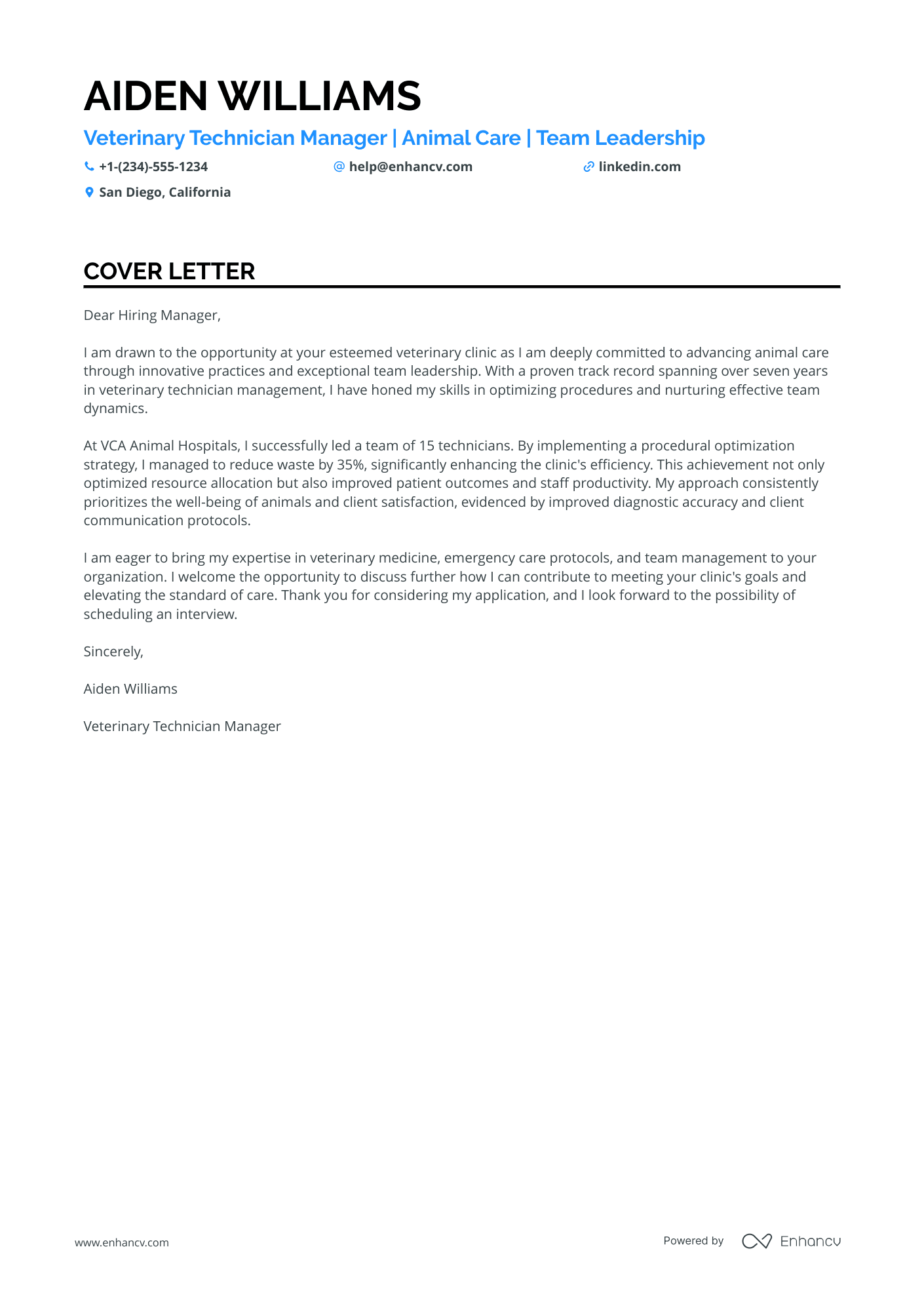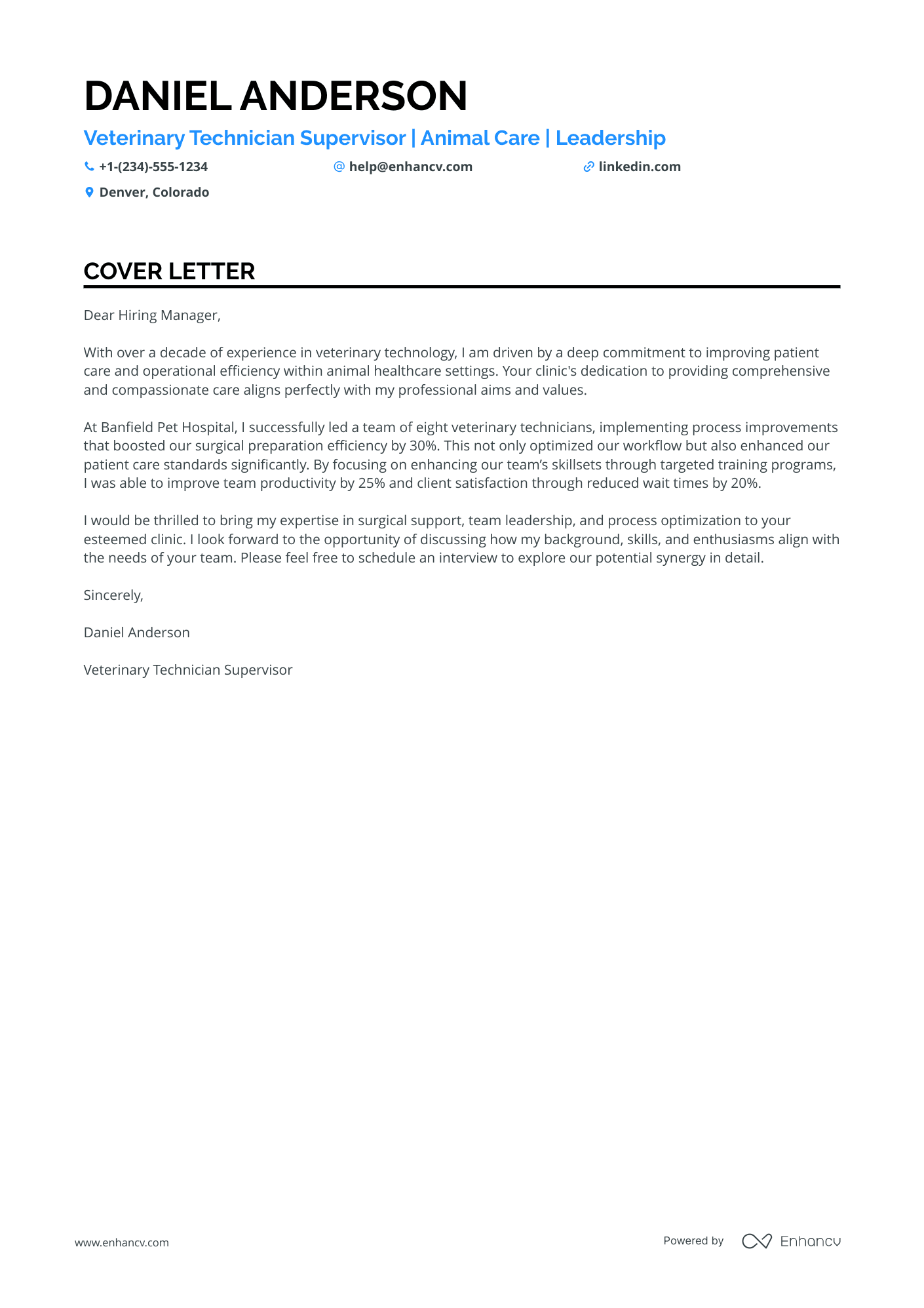As you embark on the journey to land your dream role as a veterinary technician, crafting the perfect cover letter can pose a real challenge. While your resume outlines your skills and experience, your cover letter should spotlight a singular professional triumph that you're especially proud of, weaving it into an engaging narrative. Aim for formality while steering clear of overused phrases, and remember: brevity is key—keep it to one compelling page that captures your unique story.
- Including all the must-have paragraphs in your structure for an excellent first impression;
- Learning how to write individual sections from industry-leading cover letter examples;
- Selecting the best accomplishment to tell an interesting and authority-building professional story;
- Introducing your profile with personality, while meeting industry standards.
And, if you want to save some time, drag and drop your veterinary technician resume into Enhancv's AI, which will assess your profile and write your job-winning cover letter for you.
If the veterinary technician isn't exactly the one you're looking for we have a plethora of cover letter examples for jobs like this one:
- Veterinary Technician resume guide and example
- Child Care cover letter example
- Massage Therapist cover letter example
- Social Work Student cover letter example
- Nurse Anesthetist cover letter example
- Expanded Functions Dental Assistant cover letter example
- General Dentist cover letter example
- Assistant Nurse cover letter example
- Cardiology Medical Assistant cover letter example
- Clinical Trial Manager cover letter example
- Practice Nurse cover letter example
Drop your resume here or choose a file.
PDF & DOCX only. Max 2MB file size.
Veterinary technician cover letter example
ABIGAIL HALL
San Francisco, California
+1-(234)-555-1234
help@enhancv.com
- Emphasizing a major contribution such as implementing a new system demonstrates initiative and the ability to improve clinic operations, which is valuable for a veterinary practice looking for efficiency and innovation.
- Mentioning a perfect safety record and the number of procedures oversaw showcases reliability and experience, crucial for roles that require technical competence and precision in a veterinary setting.
- Highlighting the achievement in post-operative care program improvements shows the candidate's direct positive impact on animal outcomes, a core concern for veterinary clinics committed to high standards of animal welfare.
The format of your veterinary technician cover letter: structure, fonts, margins, and more
Your veterinary technician cover letter should include a header (with your name, position, and date); a greeting and introductory paragraph; a body and closing paragraphs; and an optional signature.
Remember that you're writing your veterinary technician cover letter for recruiters - as the Applicant Tracker System won't scan this content.
Here are a few more tips and tricks to keep in mind when formatting your veterinary technician cover letter:
- Use the same font in your veterinary technician cover letter and resume. We recommend modern fonts, e.g. Lato and Rubik, to help you stand out, instead of the stereotypical Arial and Times New Roman.
- Each paragraph should have single spacing, which is already set up for you in our cover letter templates.
- Our cover letter builder follows industry standards for your veterinary technician cover letter formatting - with a one-inch margin, surrounding your content.
- Always export your veterinary technician cover letter in PDF to ensure the image or text quality stays the same and your writing isn't moved about.
Why worry about your cover letter? Create one instantly using our free cover letter generator.
The top sections on a veterinary technician cover letter
- Header: Include your name, address, phone number, and email, ensuring the recruiter can easily contact you for a veterinary technician position.
- Greeting: Address the cover letter to the specific hiring manager or clinic owner, demonstrating your attention to detail and respect for the individual reviewing your application.
- Introduction: Briefly introduce yourself and explain your passion for veterinary medicine, highlighting any previous experience that showcases your skills in animal care.
- Body: Detail your hands-on experience with animals, knowledge of veterinary medicine, technical skills (such as drawing blood, running laboratory tests, assisting in surgeries), and any specializations relevant to the job, such as emergency care or exotic animals.
- Closing: Summarize your enthusiasm for the position, restate how your skills will benefit the clinic or hospital, and thank the reader, indicating you look forward to the opportunity to discuss your qualifications further in an interview.
Key qualities recruiters search for in a candidate’s cover letter
- Clinical skills and knowledge: Recruiters seek veterinary technicians who are proficient in standard clinical procedures, such as administering medication, drawing blood, placing catheters, taking x-rays, and assisting in surgeries, to ensure the highest level of animal care and efficient clinic operations.
- Attention to detail: Precision in recording patient information, dosing medications, and monitoring changes in an animal’s condition is crucial to prevent errors in treatment and ensure accurate communications with veterinarians and pet owners.
- Compassion for animals: A genuine love for and commitment to the well-being of animals is essential to providing sensitive and empathetic care, as well as reassuring concerned pet owners.
- Ability to work under pressure: Veterinary technicians must remain calm and effective during emergency situations, busy clinic hours, and when dealing with distressed animals, demonstrating resilience and a problem-solving mindset.
- Strong communication skills: Clear and effective communication with veterinarians, colleagues, and pet owners is necessary for coordinating care, explaining complex medical terms in an understandable way, and providing updates on an animal’s condition.
- Teamwork and collaboration: Working closely with veterinarians, fellow technicians, and support staff requires a collaborative spirit and the ability to adapt to various working styles, all in the service of providing the best possible care for the animals.
Greeting recruiters with your veterinary technician cover letter salutation
What better way to start your conversation with the hiring manager, than by greeting them?
Take the time to find out who the professional, recruiting for the role, is.
Search on LinkedIn, the company website. And for those still keen on making a fantastic first impression, you could even contact the organization, asking for the recruiter's name and more details about the job.
Address recruiters in the veterinary technician greeting by either their first name or last name. (e.g. "Dear Anthony" or "Dear Ms. Smarts").
If you're unable to discover the recruiter's name - don't go for the impersonal "To whom it may concern", but instead use "Dear HR team".
List of salutations you can use
- Dear Hiring Manager,
- Dear Dr. [Last Name],
- Dear Clinic Administrator,
- Dear Practice Owner,
- Dear [Clinic or Hospital Name] Team,
- Dear Recruitment Team,
The veterinary technician cover letter introduction: focusing on your unique value, with a creative twist
You are not the only one wondering how to start your veterinary technician cover letter. Those first two sentences introduce your profile and should be memorable.
No pressure.
When beginning your veterinary technician cover letter, immediately point out the unique value of working with you. In other words, what you promise to bring to the role by using your past track record of success.
Start your veterinary technician cover letter with a creative twist by telling a joke or stating something relatable. Select this type of introduction only if it aligns with the company culture.
That one achievement in your veterinary technician cover letter body
The lengthiest part of your veterinary technician cover letter is the body.
Within the next three to six middle paragraphs, present yourself as the best candidate for the role.
How can you do that without retelling your whole professional resume?
Select one key achievement that covers job-crucial skills and technologies (and is memorable).
Within the body of your veterinary technician cover letter, aim to tell the story of how you achieved your success. Also, write about how this would help out your potential team.
Ending your veterinary technician cover letter: a closing paragraph with a promise
If you're thinking of finishing your veterinary technician cover letter with a "Sincerely yours" or "Thanks for the consideration," you need to read on.
End the final paragraph of your veterinary technician cover letter with a twist:
- a promise - of how you'd grow as a professional, part of the company, or improve organizational metrics;
- a call to action - prompt interviewers with some follow-up actions if they are interested in your profile.
A personalized ending would surely help you to stand out by being a memorable candidate.
Which story should you tell in your veterinary technician cover letter when you have zero experience
Candidates, lacking professional experience in the field - this one is for you.
Your veterinary technician cover letter is an exercise of integrity, honesty, and, above all, spinning a positive narrative around your strengths.
And what better way to capture recruiters' attention than with your most job-relevant achievement (this could be from your internship or volunteering experience)?
Make sure to back up your success with transferrable skills that are relevant to the job (e.g. how your year, studying abroad, has taught you to be more motivated and handle multicultural environments).
Another safe card you can bet on is your career dream: in the body of your veterinary technician cover letter, go into the details of how your ambitions would help make the company you're applying for better.
Key takeaways
Summarizing the most important aspects in writing your veterinary technician cover letter, remember to:
- Create a personalized veterinary technician cover letter for each role you apply for, that includes the recruiter's name in the salutation;
- Format your veterinary technician cover letter with single-spacing, one-inch margins, and a modern, yet ATS-friendly font;
- Always start off your veterinary technician cover letter with two sentences that reflect what is most important about your application;
- Your veterinary technician cover letter body should feature your biggest accomplishments and the job-relevant skills it has taught you;
- Instead of opting for the "Sincerely yours" ending, close your veterinary technician cover letter with a nod to the future with what you aim to achieve in this potential role.
Veterinary Technician cover letter examples
By Experience
Senior Veterinary Technician
- Highlighting Achievements: Emphasizing your success in developing and implementing surgical protocols showcases your impact on efficiency and patient care, making you a strong candidate for a veterinary role.
- Alignment with Organizational Values: Mentioning how your professional values and experiences align with those of the organization demonstrates your enthusiasm and compatibility with the team's goals.
- Specific Experience: Emphasizing your long-term experience, such as over a decade in animal care and surgical assistance, reinforces your expertise and reliability in the field.
- Expressing Enthusiasm: Highlighting your eagerness to discuss your potential contributions indicates your proactive attitude and genuine interest in the role.
Lead Veterinary Technician
- Highlighting Leadership Experience: The cover letter emphasizes the candidate's ability to lead a team, which is crucial for a lead role like a Veterinary Technician. This demonstrates not only their capacity to manage others but also to improve overall clinic performance.
- Quantifiable Achievements: Including specific metrics, such as improving post-surgical recovery rates by 20% and increasing client satisfaction by 22%, provides concrete evidence of the candidate’s contributions and impact in previous roles.
- Demonstrating Technical Skills: The letter details specific technical skills such as surgery assistance and patient recovery management, which are essential qualifications for a veterinary technician and align with the job requirements.
- Expressing Enthusiasm and Fit: The candidate expresses a clear interest in the organization’s values and how their expertise aligns with its goals, indicating that they have researched the company and are genuinely interested in contributing to its success.
By Role
Veterinary Technician Manager
- Highlighting leadership and management skills: The candidate emphasizes their experience in leading a team of veterinary technicians, which is crucial for a role that may involve managing clinic operations and ensuring efficient teamwork.
- Emphasizing achievements in procedural optimization: By discussing a specific success in reducing waste and improving clinic efficiency, the candidate showcases their ability to implement effective strategies that benefit the organization.
- Focusing on animal care and client satisfaction: The letter underscores the candidate's commitment to high standards of animal care and client communication, indicating an alignment with core values likely shared by the clinic.
- Demonstrating experience in emergency care protocols: Mentioning expertise in handling emergency situations highlights the candidate's readiness to manage critical cases, which can be a significant aspect of veterinary clinic operations.
Veterinary Technician Supervisor
- Highlighting specific, quantifiable achievements: The letter mentions a 30% improvement in surgical preparation efficiency and a 25% productivity increase, providing concrete examples of the candidate's impact.
- Emphasizing leadership and team development skills: Discusses leading a team and implementing targeted training programs to improve both team performance and client satisfaction.
- Aligning personal values with the company's mission: The candidate illustrates a commitment to patient care and operational efficiency, aligning personal values with the clinic's dedication to compassionate care.
- Expressing enthusiasm for applying skills to the potential employer: Conveys eagerness to bring specific expertise in surgical support and process optimization to the organization.












